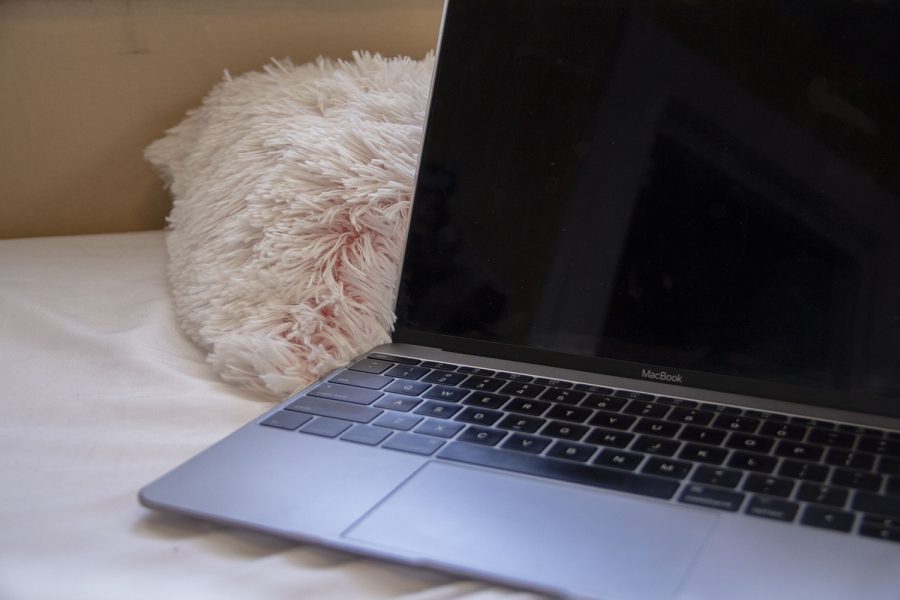Research looks to maximize supervisor, remote worker productivity
A $1.1 million grant from the Centers for Disease Control and Prevention will help researchers investigate how to maximize productivity while maintaining worker wellbeing in remote work environments over the next five years.
Photo illustration by Grace Kreber. (Grace Kreber/The Daily Iowan)
October 17, 2021
Businesses can improve work-from-home management by training managers to better understand and consider the health and wellbeing of remote workers, new University of Iowa research found.
Using a grant from the Centers for Disease Control and Prevention, research from the UI’s College of Public Health and Tippie College of Business will attempt to improve supervisors’ and workers’ well-being and decrease stress levels among those managing work-from-home environments.
The grant totals $1.1 million.
Tippie College of Business Assistant Professor Beth Livingston, principal investigator on the research project, said the work-from-home environment forced upon so many workers early in the pandemic inspired the research.
“The rate of people who had remote work available to them has been gradually increasing, but at a very low rate, and then COVID hit,” Livingston said. “All of these employers who, for so many years, said, ‘Nope, no way, you can do your job from home,’ all of the sudden said, ‘Well, sure,’ because they were trying to mitigate the effects of this virus.”
Livingston said the research is not meant to tell employers whether their employees should work from home or not, but instead inform employers how to provide the best management environment for their workers who are working from home.
“We want to figure out how we can balance our concerns about productivity with our concerns about stress and well-being,” Livingston said. “One thing that has come up during this entire pandemic is that those things are inextricably linked – that well employees are productive employees.”
Livingston said the research focuses especially on the well-being of managers. Those employees who work from home are shown to be less stressed, she said, but that stress is then offset onto their managers.
Managers have trouble giving performance feedback and figuring out if their employees are doing well without being able to see them, Livingston said.
“This is a very common thing that companies do,” Livingston said. “‘Well, I need to manage you, so you need to be here.’ The reason they say that is because they’re mistaking monitoring for management.”
Livingston added that, often, it is not the fault of inexperienced managers for mistaking monitoring for managing.
Through this research, she hopes to alleviate some of the problems she often sees in the field of remote management, Livingston said.
Diane Rohlman, director of the Healthier Workforce Center of the Midwest and co-principal investigator on this research, said Livingston’s project is one of four through the center, which applies for more funding for additional projects every five years, and did so in 2021.
Rohlman said the center has partnered with Livingston on her research to better adapt work-from-home environments for supervisors.
“There’s always been a push for moving to remote work, but with the pandemic, that’s just been accelerated,” Rohlman said. “It’s been good, in the sense that we realize we can do things differently, but it’s also made us realize we need to think through things differently.”
Rohlman said one instance where there may be a dramatic shift for supervisors is their inability, in a remote work environment, to walk down the hall to their employees’ offices and see how they’re doing.
“You’re not sure when people are working, where they’re working, what they’re doing,” Rohlman said. “[Livingston’s] focus, which is really exciting, is not trying to understand what’s going on, because we’ve got a lot of research telling us that, but how do we fix it?”
UI Professor in the Department of Management and Entrepreneurship Amy Colbert, a co-principal investigator on the research, said the project stems from surveys conducted at the UI which looked at staff members’ experiences with remote work during the early stages of the pandemic.
She said responses indicated disparities depending on supervisor effectiveness.
“Our understanding was that the quality of remote supervision was somewhat variable,” Colbert said. “Some supervisors were able to transition very effectively, some were not. We also found that remote supervisors were experiencing decreases in their wellbeing.”
The research project, Colbert said, focused especially on making sure supervisors provide support to their employees so they can continue to be productive.
Livingston said early research over the course of the next year will help to develop training programs that assist managers in creating the best possible workspace for their employees.
The research team hopes to launch the experimental programming by next fall, she said.
“[I] desire to help organizations change the lives of their employees,” Livingston said. “This is not just research that is going to end up in publications and journal articles, but it’s training that’s going to be rolled out to companies to help them improve the lives of their managers and their employees.”















